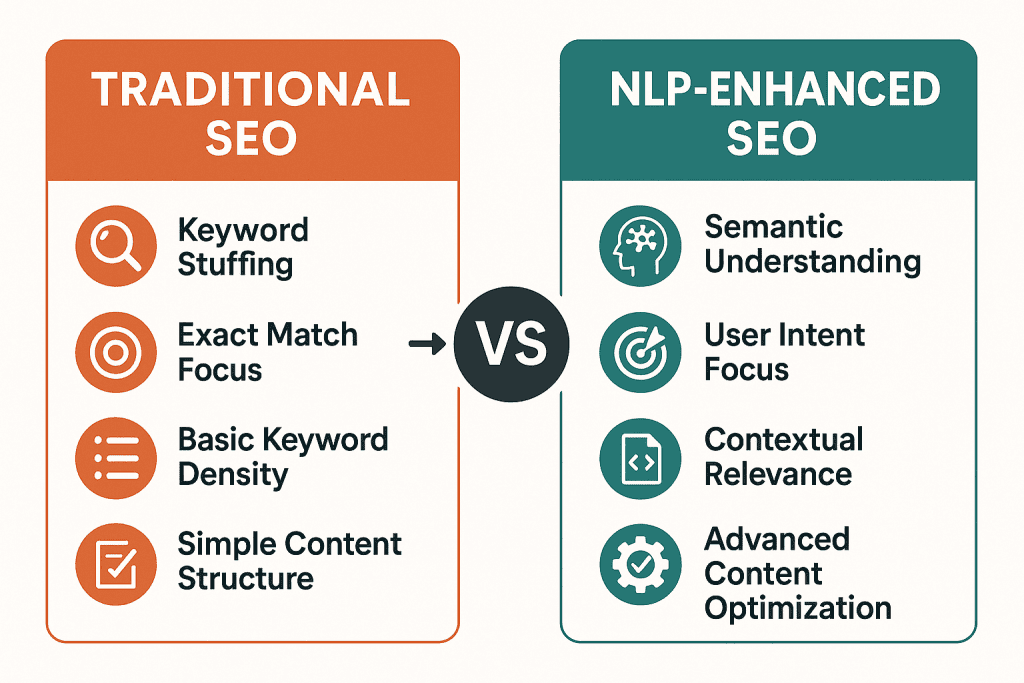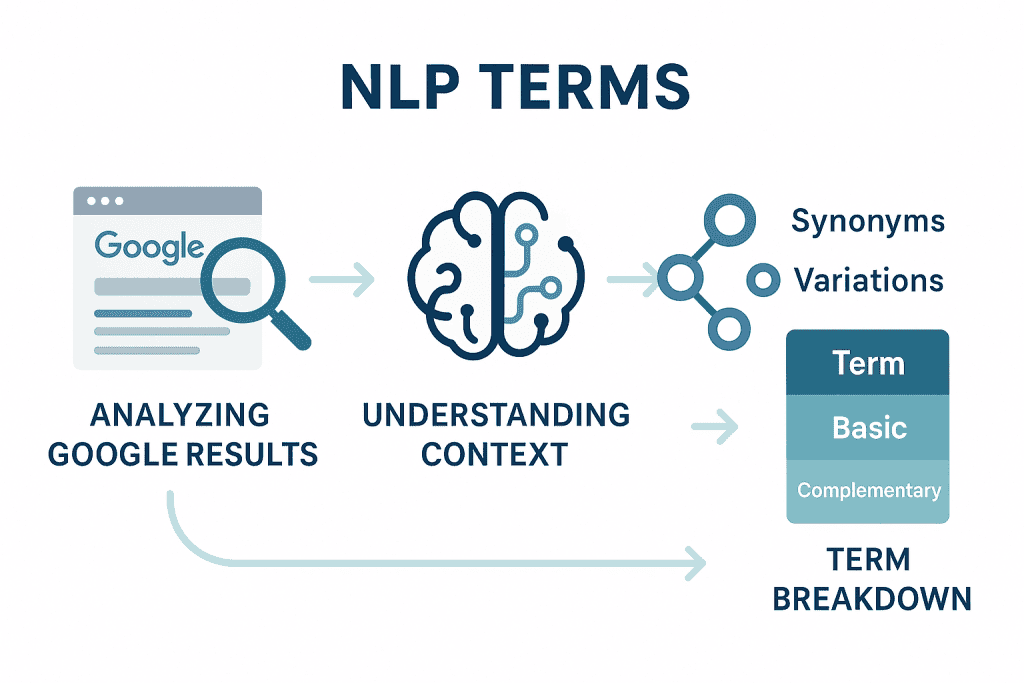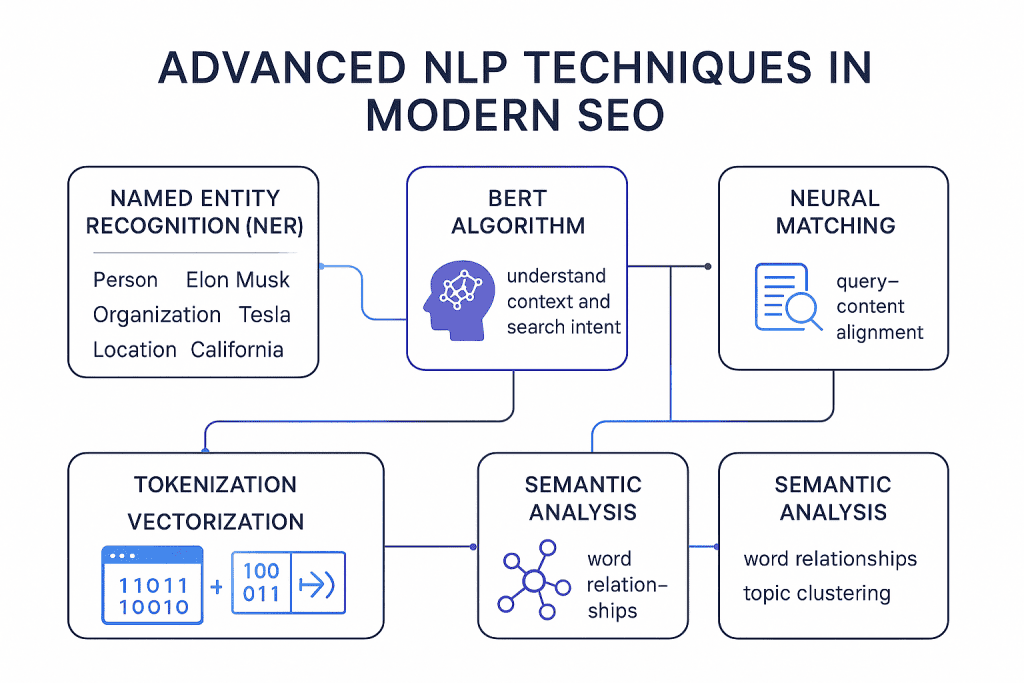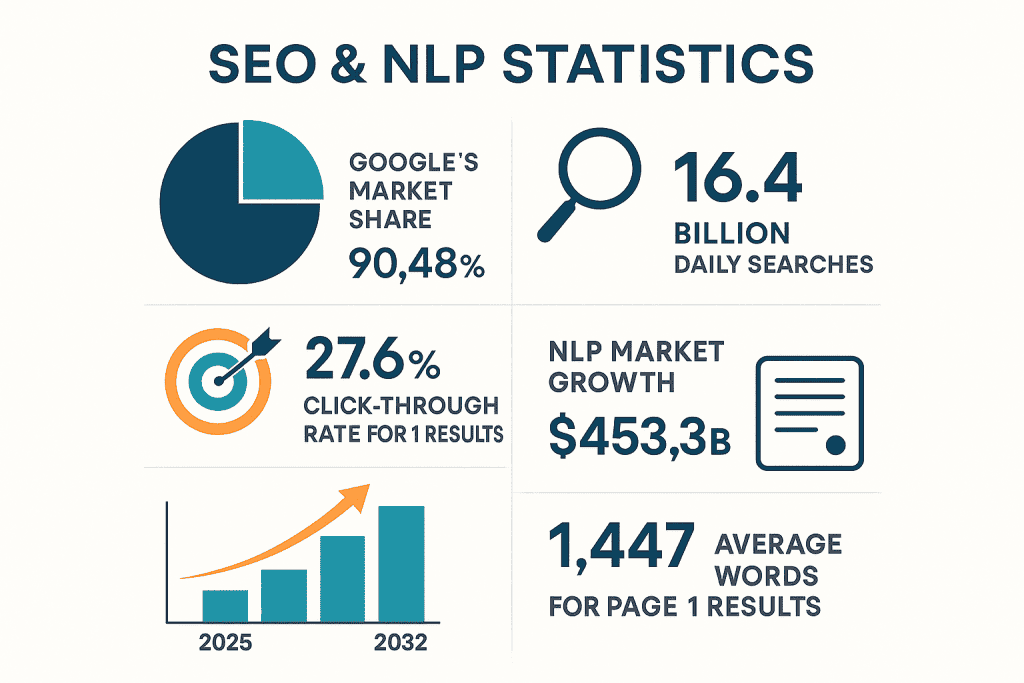Optimization “How NEURONwriter and the NLP Terms function can improve Your SEO”
In the world of digital marketing, SEO still decides about online visibility. For companies, creators and marketers, appearing on Google’s first page is not only a goal – it’s a necessity. In 2025, 5.99 trillion searches will be performed, so the fight for top positions is enormous. However, the rules have changed. It’s no longer enough to insert keywords. Today, understanding context, user intent and semantics counts, and artificial intelligence plays a breakthrough role in this, especially natural language processing (NLP).
This is where innovative tools like NEURONwriter come into play. Utilizing the power of advanced AI and NLP, it offers content creation that goes beyond basic keyword matching.
This article shows how NEURONwriter and its powerful NLP Terms function can significantly improve your SEO strategy. We’ll delve into basic concepts of semantic analysis, explore advanced NLP techniques that modern search engines utilize, and provide a practical guide to creating content that both users and algorithms will love.
The Evolution of SEO: From Keywords to Concepts.
Not so long ago, SEO was a relatively simple, albeit primitive practice. The basic strategy involved identifying a target keyword and repeating it as many times as possible throughout the content, a practice known as “keyword stuffing”. Focus was on exact keyword matches, and success was often a matter of density and repetition, not quality or relevance.
However, search engines have become exponentially more sophisticated. Google’s mission is to organize the world’s information and make it universally accessible and useful, which requires understanding language the way humans do. This led to the emergence of semantic search—focusing on understanding the meaning and intent behind a user’s query, not just individual words. As SEO expert Dave Davies states, “Content is what search engines use to fulfill user intent”.
This paradigm shift means that search engines now prioritize content that provides comprehensive, authoritative and relevant answers. They analyze relationships between words and concepts to determine the true topic of a page. This evolution from mechanical to conceptual understanding of content is the most important trend in modern SEO.

What is Natural Language Processing (NLP)?
At its core, Natural Language Processing (NLP) is a field of artificial intelligence that gives computers the ability to understand, interpret and generate human language. It’s the technology that powers everything from voice assistants like Siri and Alexa, through real-time language translation, to modern search engines. The NLP market is predicted to reach a staggering $453.3 billion by 2032, demonstrating its transformational impact across various industries.
For a computer, text is just a sequence of characters. NLP provides tools to transform this text into structured data that a machine can understand.
This includes several fundamental techniques:
Tokenization: Breaking text into smaller units, like sentences or individual words (tokens).
Vectorization: Converting these tokens into numerical representations (vectors) that algorithms can process.
Essentially, NLP teaches machines to read. It learns to identify patterns, relationships and the underlying semantic structure of language. This allows for understanding context, distinguishing between meanings of the same word (e.g., apple the fruit vs. Apple the company) and understanding nuances of human communication.
Introduction to NEURONwriter: AI-powered Content Optimization.
NEURONwriter is an advanced content editor that harnesses the power of NLP to help you create content perfectly optimized for modern search engines. It analyzes the highest-ranking pages for your target query and provides a detailed roadmap for creating content that can outperform them. At the heart of NEURONwriter is the “NLP Terms” function, a sophisticated tool that guides you in creating semantically rich and contextually relevant articles.
Unlike traditional SEO tools that focus exclusively on keyword density, the NLP Terms function in NEURONwriter provides a comprehensive list of semantically related words and phrases that Google expects to see in high-quality content on a given topic.
As one expert notes, “Your content should also contain semantic terms or related phrases in addition to the main keyword. They give context to your article and help search engines understand what the content is about”.
How the “NLP Terms” Function Works.
The process behind the NLP Terms function in NEURONwriter is a powerful application of semantic analysis, designed to mirror the way Google itself evaluates content. It involves a multi-stage process of delivering practical recommendations.

Analyzing Google SERPs: The system starts by scanning and analyzing the highest-ranking content on Google for your target query. This allows for identifying words, phrases and concepts that are consistently present on the best-performing pages.
Understanding Context: NEURONwriter then goes beyond simple word counting. It analyzes relationships between these terms to understand the broader context of the topic. This ensures that suggested terms are not just a random collection of keywords, but are part of a coherent semantic field.
Link discovery and semantic grouping: The algorithm is capable of recognizing synonyms, variants and related concepts, which helps avoid unnatural keyword repetition and create more readable content. It groups terms into logical categories, making it easier to build different sections of the article.
Term division and prioritization: Finally, NEURONwriter divides suggested terms into three categories:
• Basic terms: These are the most crucial terms directly related to your topic. They are essential for establishing relevance.
• Supplementary terms: These terms help develop main topics and add depth to content.
• Contextual terms: These words provide additional information and supporting details, helping to clarify meaning and more comprehensively satisfy user intent.
Each term also receives an importance score, allowing for prioritization of terms to include in order to achieve the highest optimization score.
Advanced NLP Techniques in Modern SEO
To fully appreciate the power of tools like NEURONwriter, it’s helpful to understand the advanced NLP techniques that search engines like Google use to rank content. These are sophisticated algorithms working behind the scenes to decipher the meaning and quality of every page on the web.

Named Entity Recognition (NER).
Named Entity Recognition (NER) is an NLP technique that automatically identifies and classifies named entities in text into predefined categories, such as people, organizations, locations, dates and products. When you write “Albert Einstein was born in Ulm in Germany”, NER allows Google to recognize “Albert Einstein” as a person, “Ulm” as a location and “Germany” as a country. This helps Google build a network of connected knowledge, understanding not only what your content says, but what it’s about.
BERT and Neural Matching.
BERT (Bidirectional Encoder Representations from Transformers) was a breakthrough Google algorithm update that significantly improved its ability to understand the context of words in a search query. BERT’s “bidirectional” nature allows it to look at words that appear before and after a term to understand its true meaning. For example, in the query “how to park a car on a hill”, BERT understands that “park” refers to the action of parking a vehicle, not a public park.
Neural matching is another AI-powered technique that helps Google match a user’s query with concepts on a webpage, even if exact keywords are not present. It goes beyond keyword matching to a more abstract understanding of the topic, allowing for more relevant results to surface.
The Power of Semantic Analysis for SEO.
Semantic analysis is the process of extracting meaning from text. In the context of SEO, it’s about ensuring that your content is not just a collection of keywords, but a comprehensive and coherent exploration of a topic. This is crucial because Google no longer ranks pages based on individual keywords. Instead, it ranks them based on their ability to cover a topic comprehensively.
That’s why one well-written article can rank for hundreds, even thousands of related keywords. By focusing on semantic SEO, you create content rich in context, answering a wide range of related user questions and establishing your page as an authoritative source. Data confirms this: the average first-page Google result contains 1,447 words, indicating that comprehensive, in-depth content is rewarded.
Practical Guide to Using NEURONwriter and NLP Terms.
-
Start with your target query: Enter your main topic or keyword into the NEURONwriter dashboard. The tool will then analyze the top 30 Google results and prepare a detailed report.
-
Analyze the competition: Before starting to write, review the competitive analysis. Look at their content scores, word counts and terms they use. This will give you a clear reference point to measure against.
-
Integrate NLP Terms naturally: When writing your article in the NEURONwriter editor, the NLP terms list will be on the right side. Your goal is to weave these terms into the content in a natural and organic way. Don’t force them; let them guide the structure and flow of your writing. As you use the terms, your content score will increase in real-time.
-
Focus on user intent: Remember that the ultimate goal is creating content valuable to the reader. Use NLP terms to ensure you’re covering all subtopics and answering all potential questions a user might have. As Bill Gates famously said, “Content is king”.
-
Optimize headings and structure: Use suggested H1, H2 and H3 terms to logically structure your article. This not only improves readability for users, but also helps search engines understand the hierarchy and main sections of your content.
-
Strive for a high score, but prioritize quality: While it’s tempting to chase a perfect score, always prioritize readability and natural language. A score of 75+ is generally excellent. Remember the advice: “Good SEO work only improves with time. It’s only search engine tricks that must change when ranking algorithms change”.
The Tangible Benefits of Using NEURONwriter.
- Adopting a tool like NEURONwriter and embracing an NLP-driven approach to SEO can deliver significant and measurable benefits:
- Higher Search Rankings: By creating content that is semantically aligned with what Google considers high-quality, you dramatically increase your chances of ranking on the first page. The #1 result in Google gets approximately 27.6% of all clicks, so the rewards are substantial .
- Increased Organic Traffic: Higher rankings naturally lead to more organic traffic. As one marketer put it, “Today it’s not about ‘get the traffic’, it’s about ‘get the targeted and relevant traffic’”.
- Improved User Engagement: Content that is comprehensive and easy to read keeps users on your page longer. This sends positive signals to Google, further boosting your rankings.
- Greater Content Efficiency: NEURONwriter streamlines the content creation process, providing a clear and data-driven plan. This saves you time and effort, allowing you to produce more high-quality content.

Conclusion: The Future of SEO is Semantic.
The world of SEO is no longer a simple game of keywords. It is a sophisticated and dynamic field where understanding language, context, and user intent is paramount. The rise of NLP and AI has created a new frontier for content optimization, one where quality and relevance are rewarded above all else. Tools like NEURONwriter are at the forefront of this revolution, providing marketers and creators with the insights and guidance needed to succeed in this new era.
By embracing the power of the “NLP Terms” feature and focusing on creating semantically rich, comprehensive, and user-centric content, you can unlock new levels of SEO performance. For those looking to dive deeper into advanced optimization techniques, NEURONwriter context vector optimization approach provides additional insights into how every element of your content contributes to semantic understanding. The future of SEO is semantic, and with the right tools and strategies, you can ensure that your content not only ranks but also resonates, engages, and converts.
